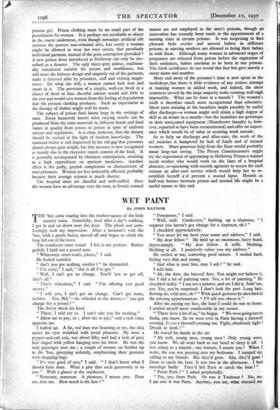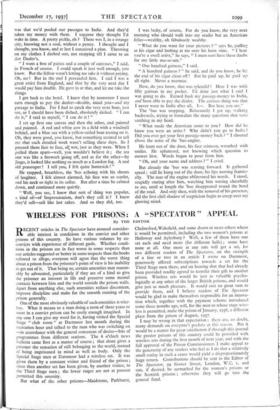WET PAINT
By JOHN RAYNOR
THE 'bus came roaring into the market-square of the little country town. Gratefully, tired after a day's walking, I got in and sat down near the door. The plush seat com- fortingly took my impression. After a moment's wait the 'bus, with a gentle heave, moved off and began to climb the long hill out of the town.
The conductor came round. I felt in my pockets. Rather guiltily I held out a pound note.
" Whiteways cross-roads, please," I said.
He looked scornful.
" Ain't you got nothing smaller ? " he demanded. " I'm sorry," I said, " this is all I've got."
" Well, I ain't got no change. You'll 'ave to get off, that's all."
" That's ridiculous," I said. " I'm offering you good money."
" I told you, I ain't got no change. Can't get none, neither. 'Ere, Bill,"—he whistled to the driver,—" you got change for a pound ? "
The driver shook his head.
" There, I told yer so. I can't take you for nothing."
" Allow me to pay, sir ; allow me to pay," said a rich voice opposite me.
I looked up. A fat, red man was beaming at me, the skin under his eyes wrinkled with jovial pleasure. He wore a pepper-and-salt suit, was about fifty, and had a lock of grey hair tinged with yellow hanging over his brow. He was the only passenger near me ; a couple of women sat further up in the 'bus, gossiping ardently, emphasising their gestures with shopping-bags.
" It's very good of you," I said. " I don't know what I should have done. What a pity that such generosity is so rare." With a glance at the conductor.
" Nonsense, nonsense. A pleasure, I assure you. Dear me, dear me. How much is the fare ? " " Fourpence," I said.
" Well, well. Conductor," holding up a sixpence, " I suppose you haven't got change for a sixpence, eh ? " I chuckled appreciatively.
" You must let me have your name and address," I said. " My dear fellow." He held up an enormous, hairy hand, deprecatingly. " My dear fellow. A trifle. Nothing. Nothing at all. I positively refuse you my address."
He smiled at me, scattering good nature. I smiled back, feeling very thin and young.
" And what is your line, may I ask ? " he said.
I told him.
" Ah, the Arts, the blessed Arts. You might not believe it, but I did a lot of painting once. Yes, a lot of painting." He chuckled richly. " I am not a painter, and yet I did it. Sold 'em, too. Yes, you're surprised. I don't look the part. Long hair, flowing tie, wild eyes, eh ? " With quick gestures he sketched in the missing appurtenances. " tell you about it."
After his paying my fare, the least I could do was to listen. I settled myself more comfortably in my corner.
" There were a lot of us," he began. " We were going out to India, you know. So we were over in Paris having a farewell evening. It was a farewell evening too. Tight, absolutely tight ! Drunk as lords ! "
He waved his hands in the air.
" Ah well, young men, young men ! Only young once, you know. We all went back to our hotel to sleep it off. I was asleep in a minute ; one minute, I assure you ! When I woke, the sun was pouring into my bedroom. I jumped up, calling to my friends. But they'd gone. Aba, they'd gone ! Gone to catch the boat. It was two in the afternoon. I had overslept badly. They'd left Paris to catch the boat ! "
" From Paris ? " I asked perplexedly.
" Yes, yes, from Paris. Or was it Toulouse ? No, no, I am sure it was Paris. Anyway, you see, what worried me was that we'd pooled our passages to India. And they'd taken my money with them. I suppose they thought I'd wake in time. A pretty pickle, eh ? There was I, in a strange city, knowing not a soul, without a penny. I thought and I thought, you know, and at last I conceived a plan. Throwing on my clothes I dashed out, not stopping till I came to an Art Dealer's.
" I want a box of paints and a couple of canvases," I said, in French of course. I could speak it just well enough, you know. But the fellow wasn't letting me take it without paying. Oh, no ! But in the end I persuaded him. I said I was a great artist from England, and that by the very next day I would pay him double. He gave in at that, and let me take the things.
I got back to the hotel. I knew that by tomorrow I must earn enough to pay the dealer—double, mind you—and my passage to India. For I had to catch the very next boat, you see, or I should have been dished, absolutely dished. " I can do it," I said to myself, " I can do it ! "
I set up first one canvas and then the other, and painted and painted. A red and white cow in a field with a windmill behind, and a blue sea with a yellow-sailed boat tossing on it. Oh, they were good, you know, but something seemed to tell me that such detailed work wasn't selling these days. So I pressed them face to face, all wet, just as they were. When .I pulled them apart—well, you wouldn't believe it ; the sea one was like a firework going off, and as for the other—by Jingo, it looked like nothing so much as a London fog. A real old peasouper:! I tell you, I felt quite homesick ! "
He stopped, breathless, the 'bus echoing with his shouts of laughter. I felt almost alarmed, his face was so scarlet, and his neck so tight in its collar. But after a time he calmed down, and continued more quietly.
" Well, you see, I knew that sort of thing was popular, a kind of—of Impressionism, don't they call it ? I knew they'd sell—sell like hot cakes. And so they did, too. I was lucky, of course, For do you know, the very next morning who should walk into my studio but an American feller—wealthy, oh fabulously wealthy.
" What do you want for your pictures ? " says he, puffing at his cigar and looking at me over his horn rims. " I hear you're a swell artist," he says, " I must sure have these daubs for my little mu-se-um."
" One hundred guineas," I said.
" A hundred guineas ? " he said, and do you know, he bit the end of his cigar clean off ! But he paid up, he paid up all right. Never a murmur.
Now, do you know, that was splendid ! Here I was with fifty guineas in my pocket. I'd done just what I said I was going to do. Earned back my passage-money to India, and been able to pay the dealer. The curious thing was that I never went to India after all, I—. But here you are."
The 'bus was stopping. Reluctantly I got up, walking backwards, trying to formulate the many questions that were seething in my head.
" What made the American come to you ? How did he know you were an artist ? Why didn't you go to India ? Did you ever get your first passage-money back ? " I shouted above the noise of the 'bus-engine.
He leant out of the door, his face crimson, wreathed with smiles. He spluttered, not knowing which question to answer first. Words began to pour from him.
" Oh, and your name and address ? " I cried.
But already the 'bus was starting forward. It gathered speed ; still he hung out of the door, his lips moving frantic- ally. The roar of the engine obliterated his words. I stood, stupidly staring after him, watching him waving cheerfully to me, until at length the 'bus disappeared round the bend of the road. And only then, with the removal of his presence, did the first chill shadow of scepticism begin to creep over my glowing mind.















































 Previous page
Previous page